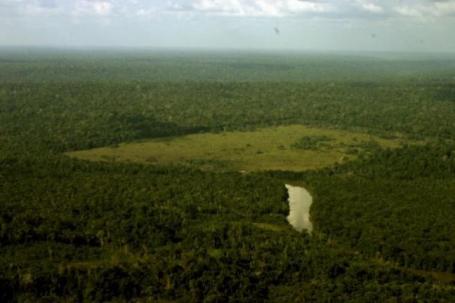Forests and REDD+ in COP17 Durban

With all its complex processes and acronyms, it’s easy to forget that the international climate change negotiations are supposed to lead to changes on the ground. There have been several developments this year, however, which should remind us of the urgency of the task and the importance of getting each piece of the puzzle right, including incentives for developing countries to reduce their emissions from deforestation and forest degradation (REDD+).
Let’s consider, for example, the recent reports from Brazil. Between March and April of this year, the Brazilian government confirmed that deforested area increased 473% compared to the same time period in 2010. Some people believe that proposed changes in Brazil’s Forest Code sparked this increase. Many also believe that the revised law, if passed, will lead to further deforestation and prevent Brazil from meeting its 2009 emission reduction target. This is sobering news from a country that had been a leader in reducing deforestation.
In Indonesia, a recent study by the Center for International Forestry Research found that large natural forest areas are still at risk of clearance, even after the passage of a moratorium on new oil palm permits, a cornerstone of Indonesia’s REDD+ strategy. This report raises questions about how the REDD+ strategy is being designed, and whether it will achieve the emission reduction, social, and biodiversity objectives associated with achieving REDD+ as defined in the Cancun Agreements in 2010.
Read more COP17 commentary from our experts on the UNFCCC:
- Week Two in Durban Climate Talks: The Clock is Ticking
- What to Aim For, and Expect, in Durban
- The Challenge of Legal Form
- Climate Finance
- Periodic Review
- Measurement, Reporting, and Verification (MRV): The Task at Hand
- MRV: Five Lessons From Other Regimes
- Adaptation
- Forests and REDD+
- MRV and Forest Monitoring
More information on China and COP17 at ChinaFAQs.org.
The situations in Brazil and Indonesia should lend a sense of urgency and purpose to the climate negotiations in Durban, South Africa. This will be the fifth year of REDD+ negotiations (seventh if you consider the very first proposals in 2005), and there are still some fundamental issues on the table. Until these are resolved, forested countries may be hindered in developing robust REDD+ programs and tackling deforestation pressures. Primarily this requires answering the first of two major questions posed by the REDD+ Chair in the Panama negotiations in October:
- what should be paid for in “results-based” actions, and
- where should the money come from?
There are reasons to believe we can make a dent on both these issues in Durban. Throughout the year, REDD+ negotiators have seemed willing to work together. In Panama, they greeted each other warmly and talked of being a “REDD+ family.” The Chair spoke of being frank and putting concrete proposals on the table. And the collaborative spirit remained throughout the week. This is significant since one of the main topics of the negotiations – what sources of finance should be available to create incentives for REDD— has resulted in heated discussions in the past.
The negotiators are also developing a better understanding of the challenges associated with implementing REDD+, thanks largely to information emerging from on-the-ground pilot programs. Negotiators seem to be talking more practically about how to design a system of incentives, are focusing more directly on the drivers of deforestation, and thinking in more concrete terms about the value of REDD+ safeguards for achieving emissions reductions and broader environmental and social objectives. But the challenge in Durban will be for negotiators to resist focusing too much on the second question, “where the money should come from.” Although important, this question requires answers from other parts of the climate negotiations. Spending a lot of time on this issue therefore may not be the best use of time.
Rather, what would be most useful is if REDD+ negotiators could spend time on two things:
First, they should better define what successful result-based REDD+ activities will look like. For example, if promoting the social and environmental objectives agreed to in Cancun is a fundamental aspect of achieving REDD+, it would be helpful to introduce text clarifying that countries that take REDD+ safeguards seriously will be rewarded. Negotiators should also discuss where there will be different types of results recognized – for example, implementation of policies versus emission reduction results. Clarifying whether there will be different types of finance linked to these different “results” could also be helpful. Both will be important for REDD+ countries as they define strategies and investment priorities.
Clarifying what successful REDD+ actions look like will also help guide the negotiators through the more technical REDD+ discussions in Durban. Negotiators are supposed to develop guidance and modalities for how to set reference emission levels, develop transparent and robust forest monitoring systems, and establish systems for providing information on how the REDD+ safeguards are being addressed and respected. These modalities should be guided by the common vision of what successful REDD+ activities will be. Their development will be helpful to REDD+ countries even if complete guidance and modalities are not delivered.
Second, negotiators should discuss the drivers of deforestation and what other types of incentives might be created specifically looking at those drivers. Though there is currently not much space in the negotiations to address this area, Parties should create a work plan to start thinking through these issues.
The Cancun Agreements went a long way to define the contours of what REDD+ will look like. In Durban we need to start filling in the details and giving REDD+ countries the clarity and support they need to move forward with the difficult task of changing how forests are perceived and managed in their countries. Clearly there is a lot of work ahead, but each step forward is important.